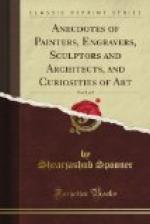John Griffier, a Dutch painter of celebrity, went to London in 1667, where he met with great encouragement. While there he painted many views on the Thames, and in order to observe nature more attentively, he bought a yacht, embarked his family, and spent his whole time on the river. After several years he sailed for Holland in his frail craft but was wrecked in the Texel, where, after eight days of suffering, he and his family barely escaped with their lives, having lost all his paintings, and the fruits of his industry. This mishap cured him of his passion for the sea.
ANECDOTE OF JOHN DE MABUSE.
An amusing anecdote is related of this eminent painter. He was inordinately given to dissipation, and spent all his money, as fast as he earned it, in carousing with his boon companions. He was for a long time in the service of the Marquess de Veren, for whom he executed some of his most capital works. It happened on one occasion that the Emperor Charles V. made a visit to the Marquess, who made magnificent preparations for his reception, and among other things ordered all his household to be dressed in white damask. When the tailor came to measure Mabuse, he desired to have the damask, under the pretence of inventing a singular habit. He sold it immediately, spent the money, and then painted a paper suit, so like damask that it was not distinguished as he walked in procession between a philosopher and a poet, other pensioners of the Marquess; but the joke was too good to be kept, so his friends betrayed him to the Marquess, who, instead of being displeased was highly diverted, and asked the Emperor which of the three suits he liked best. The Emperor pointed to that of Mabuse, as excelling in whiteness and beauty of the flowers; and when he was told of the painter’s stratagem, he would not believe it, till he had examined it with his own hands.
CAPUGNANO AND LIONELLO SPADA.
Lanzi relates the following amusing anecdote of Giovanni da Capugnano, an artist of little merit, but whose assurance enabled him to attract considerable attention in his day. “Misled by a pleasing self-delusion, he believed himself born to become a painter; like that ancient personage, mentioned by Horace, who imagined himself the owner of all the vessels that arrived in the Athenian port. His chief talent lay in making crucifixes, to fill up the angles, and in giving a varnish to the balustrades. Next, he attempted landscape in water-colors, in which were exhibited the most strange proportions; of houses less than the men; these last smaller than his sheep; and the sheep again than his birds. Extolled, however, in his own district, he determined to leave his native mountains, and figure on a wider theatre at Bologna; there he opened his house, and requested the Caracci, the only artists he believed to be more learned than himself,




